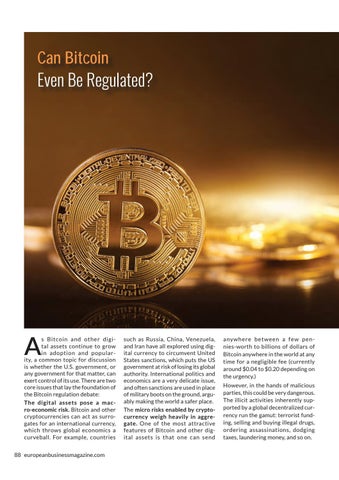Can Bitcoin Even Be Regulated?
A
s Bitcoin and other digital assets continue to grow in adoption and popularity, a common topic for discussion is whether the U.S. government, or any government for that matter, can exert control of its use. There are two core issues that lay the foundation of the Bitcoin regulation debate: The digital assets pose a macro-economic risk. Bitcoin and other cryptocurrencies can act as surrogates for an international currency, which throws global economics a curveball. For example, countries 88 europeanbusinessmagazine.com
such as Russia, China, Venezuela, and Iran have all explored using digital currency to circumvent United States sanctions, which puts the US government at risk of losing its global authority. International politics and economics are a very delicate issue, and often sanctions are used in place of military boots on the ground, arguably making the world a safer place. The micro risks enabled by cryptocurrency weigh heavily in aggregate. One of the most attractive features of Bitcoin and other digital assets is that one can send
anywhere between a few pennies-worth to billions of dollars of Bitcoin anywhere in the world at any time for a negligible fee (currently around $0.04 to $0.20 depending on the urgency.) However, in the hands of malicious parties, this could be very dangerous. The illicit activities inherently supported by a global decentralized currency run the gamut: terrorist funding, selling and buying illegal drugs, ordering assassinations, dodging taxes, laundering money, and so on.





































